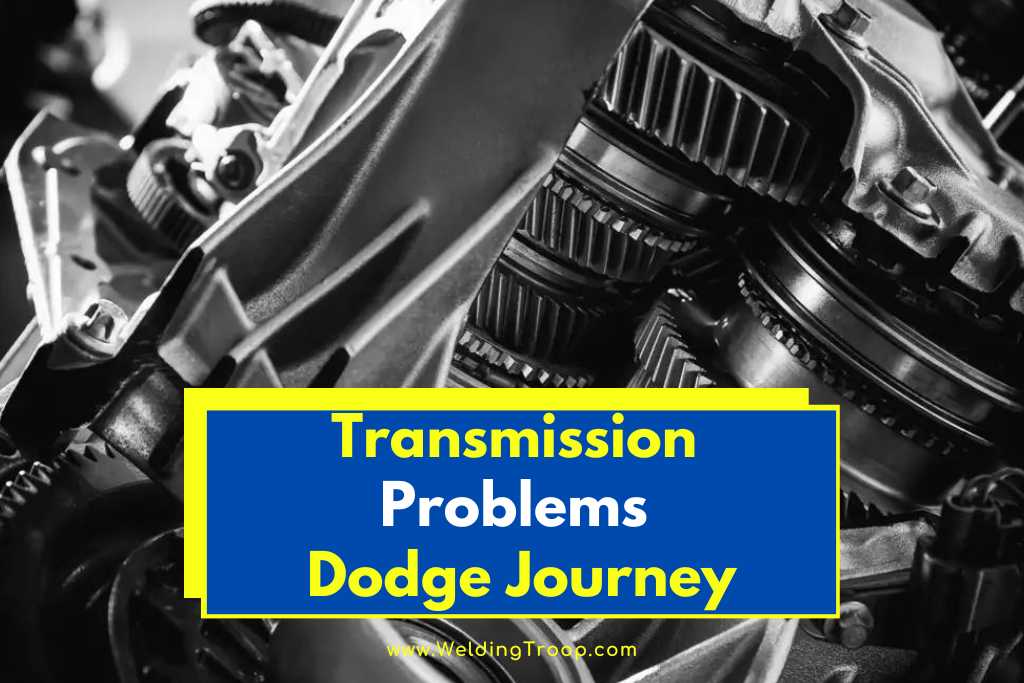The Dodge Journey has gained popularity among families for its versatility and affordability. However, like any vehicle, it is not immune to transmission problems.
In this comprehensive guide, we will explore the common issues that Dodge Journey owners may encounter with their transmissions.
We will provide insights into the symptoms, causes, and potential solutions for each problem. By understanding these transmission problems and taking the necessary steps to address them, you can ensure the longevity and performance of your Dodge Journey.
Table of Contents
1. Understanding Dodge Journey Transmissions
Before delving into the specific problems that Dodge Journey transmissions can encounter, it’s important to have a basic understanding of the transmission systems used in these vehicles.
The Dodge Journey is equipped with automatic transmissions, specifically the A604 (41TE) transmission for models up to 2008 and the 62TE transmission for 2008 and later models.
These transmissions are responsible for transferring power from the engine to the wheels, allowing the vehicle to shift gears automatically.
2. Common Transmission Problems
2.1 Delayed Shifting
One of the most common issues reported by Dodge Journey owners is delayed shifting. This problem is characterized by a noticeable delay or hesitation when shifting gears, particularly when accelerating or decelerating. Drivers may experience a lack of responsiveness or a sluggish transition between gears.
Causes: Delayed shifting in Dodge Journey transmissions can be caused by a variety of factors, including worn clutches, malfunctioning solenoids, or software glitches.
Solutions: To address delayed shifting, it is recommended to reset the transmission’s software settings or have a professional mechanic inspect and potentially replace faulty solenoids. Additionally, ensuring regular maintenance, such as fluid changes, can help prevent this problem.
2.2 Transmission Slipping
Transmission slipping is another common problem faced by Dodge Journey owners. Slipping occurs when the transmission fails to maintain a consistent connection between the engine and the wheels, resulting in a loss of power and erratic shifting.
Causes: Transmission slipping can be caused by worn clutch plates, damaged bands, low transmission fluid levels, or issues with the torque converter.
Solutions: If your Dodge Journey is experiencing transmission slipping, it is crucial to have it inspected by a qualified mechanic. They will diagnose the specific cause of the slipping and recommend appropriate repairs, which may include replacing worn clutch components or addressing fluid leaks.
2.3 Incorrect Gear Ratio
Incorrect gear ratio is a problem that can affect the performance and efficiency of a Dodge Journey’s transmission. This issue occurs when the transmission fails to shift into the appropriate gear for the current driving conditions, resulting in poor acceleration, reduced fuel efficiency, and potential damage to the transmission.
Causes: Incorrect gear ratio can be caused by various factors, including faulty sensors, wiring issues, or mechanical problems within the transmission.
Solutions: To resolve this problem, it is important to have the transmission’s electrical connections and sensor wiring inspected for any damage or corrosion. Repairing or replacing faulty components can restore the correct gear ratio and optimize the transmission’s performance.
2.4 Jerking and Hesitation
Jerking and hesitation during gear shifts are common complaints among Dodge Journey owners. These issues can make the driving experience uncomfortable and may indicate underlying problems with the transmission’s internal components.
Causes: Jerking and hesitation can be caused by worn clutches, damaged solenoids, or issues with the transmission fluid pressure.
Solutions: To address jerking and hesitation, it is recommended to have the transmission fluid level and condition checked. If necessary, a fluid flush or replacement may be required. Additionally, a professional inspection of the transmission’s internal components can help identify any worn or damaged parts that may need to be repaired or replaced.
2.5 Torque Converter Issues
Torque converter problems can significantly impact the performance and efficiency of a Dodge Journey’s transmission. The torque converter is responsible for transmitting power from the engine to the transmission, allowing the vehicle to move smoothly.
Causes: Torque converter issues can be caused by worn clutch plates, damaged seals, or malfunctioning solenoids.
Solutions: If you suspect torque converter problems, it is important to have a professional mechanic diagnose the issue. Depending on the severity of the problem, repairs may involve replacing worn or damaged components within the torque converter or replacing the entire assembly.
Read also >> Automatic Transmission Problems Shifting Gears (Solved!)
3. Identifying the Symptoms
Identifying the symptoms associated with Dodge Journey transmission problems is crucial for prompt diagnosis and repair. Here are some common signs that indicate potential transmission issues:
- Delayed or sluggish shifting
- Transmission slipping or erratic shifting
- Whining or grinding noises during gear changes
- Jerking or hesitation during acceleration or deceleration
- Burning smells or fluid leaks
- Illuminated check engine light or transmission warning light
- Reduced fuel efficiency
- Loss of power or inability to engage specific gears
If you experience any of these symptoms, it is important to consult a professional mechanic for a thorough inspection and diagnosis of your Dodge Journey’s transmission.
4. Diagnosing Dodge Journey Transmission Problems
Diagnosing Dodge Journey transmission problems requires specialized knowledge and diagnostic tools. If you suspect a transmission issue, it is recommended to visit a reputable transmission repair center or dealership.
A professional technician will use advanced diagnostic equipment to read any stored trouble codes and perform a comprehensive inspection of the transmission system.
By analyzing the diagnostic codes and conducting a visual inspection, the technician can identify the specific cause of the problem and recommend appropriate repairs.
This may involve conducting further tests, such as a transmission fluid pressure test or a road test, to gather additional information.
5. Preventive Maintenance for Dodge Journey Transmissions
Regular maintenance is essential for preventing transmission problems in your Dodge Journey. Here are some preventive maintenance tips to keep your transmission in optimal condition:
- Follow the manufacturer’s recommended maintenance schedule for fluid changes and inspections.
- Regularly check the transmission fluid level and condition using the dipstick.
- Ensure that the transmission cooler is functioning properly and free from debris.
- Avoid excessive towing or overloading, as these can put additional strain on the transmission.
- Be mindful of your driving habits and avoid harsh acceleration or sudden shifts.
- Address any fluid leaks promptly to prevent damage to the transmission.
By taking these preventive measures, you can minimize the risk of transmission problems and extend the lifespan of your Dodge Journey’s transmission.
6. Dodge Journey Transmission Repair Cost
The cost of repairing a Dodge Journey’s transmission can vary depending on the specific issue, the severity of the damage, and the location of the repair center.
In general, transmission repairs can range from a few hundred dollars for minor fixes to several thousand dollars for major repairs or transmission replacement.
To get an accurate estimate for your specific situation, it is recommended to consult with multiple reputable transmission repair centers and obtain detailed quotes. Additionally, be sure to inquire about any warranties or guarantees offered by the repair center.
7. Dodge Journey Transmission Recalls and Technical Service Bulletins
Recalls and Technical Service Bulletins (TSBs) are important resources for Dodge Journey owners, as they provide information about known transmission issues and potential solutions.
Checking for recalls and TSBs specific to your vehicle can help you stay informed and address any manufacturer-identified problems.
To check for recalls, visit the National Highway Traffic Safety Administration (NHTSA) website and enter your vehicle identification number (VIN).
For TSBs, consult the manufacturer’s official website or contact a Dodge dealership for the most up-to-date information.
8. FAQs
Q: Do Dodge Journey vehicles have transmission problems? A: Yes, Dodge Journey vehicles are known to experience transmission problems, including delayed shifting, slipping, incorrect gear ratios, jerking, and torque converter issues.
Q: What are the main problems with Dodge Journey vehicles? A: In addition to transmission problems, Dodge Journey vehicles may experience issues with the remote keyless entry system, water leaks, engine overheating, vibration during braking, power steering pump noise, and check engine light errors.
Q: How can I prevent transmission problems in my Dodge Journey? A: Regularly changing transmission fluid, following the manufacturer’s maintenance schedule, avoiding excessive towing or overloading, and practicing smooth driving habits can help prevent transmission problems in your Dodge Journey.
9. Conclusion
Being aware of the common transmission problems that Dodge Journey owners may face is essential for maintaining the performance and longevity of your vehicle.
By recognizing the symptoms, diagnosing the issues, and taking preventive measures, you can address transmission problems promptly and minimize the risk of further damage. If you experience any transmission-related symptoms or have concerns about your Dodge Journey’s transmission, it is always advisable to consult with a professional mechanic or transmission specialist for an accurate diagnosis and appropriate repairs.
With proper care and maintenance, your Dodge Journey can provide reliable and enjoyable transportation for many years to come.

